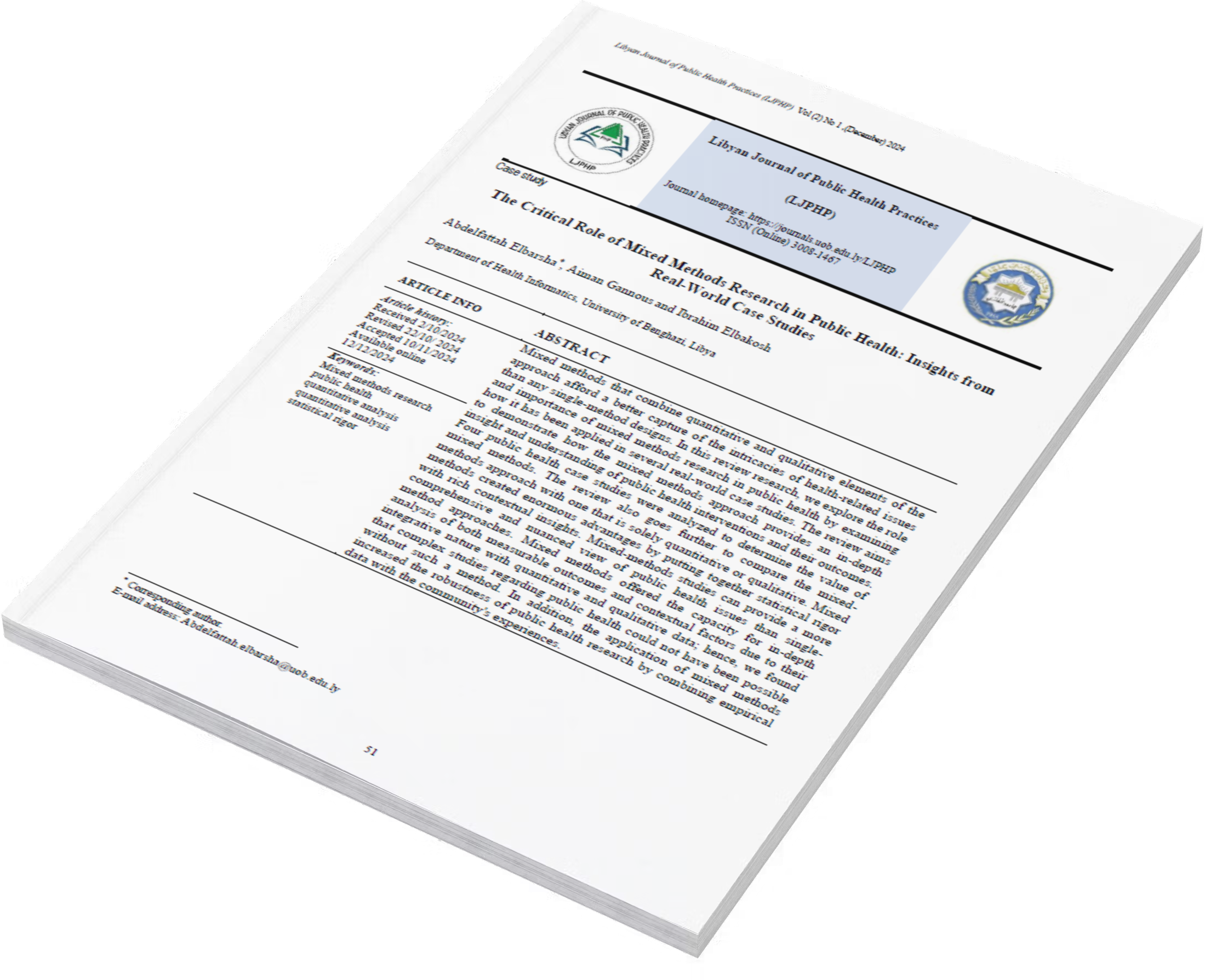The Critical Role of Mixed Methods Research in Public Health: Insights from Real-World Case Studies
DOI:
https://doi.org/10.37376/ljphp.v1i2.7084Keywords:
Mixed methods research, public health, quantitative analysis, statistical rigorAbstract
Mixed methods that combine quantitative and qualitative elements of the approach afford a better capture of the intricacies of health-related issues than any single-method designs. In this review research, we explore the role and importance of mixed methods research in public health by examining how it has been applied in several real-world case studies. The review aims to demonstrate how the mixed methods approach provides an in-depth insight and understanding of public health interventions and their outcomes.
Four public health case studies were analyzed to determine the value of mixed methods. The review also goes further to compare the mixed-methods approach with one that is solely quantitative or qualitative. Mixed methods created enormous advantages by putting together statistical rigor with rich contextual insights. Mixed-methods studies can provide a more comprehensive and nuanced view of public health issues than single-method approaches. Mixed methods offered the capacity for in-depth analysis of both measurable outcomes and contextual factors due to their integrative nature with quantitative and qualitative data; hence, we found that complex studies regarding public health could not have been possible without such a method. In addition, the application of mixed methods increased the robustness of public health research by combining empirical data with the community's experiences.
References
- Creswell JW, Clark VLP. Designing and Conducting Mixed Methods Research. Sage Publications; 2017.
- Johnson RB, Onwuegbuzie AJ, Turner LA. Toward a definition of mixed methods research. J Mixed Methods Res. 2007;1(2):112-133. doi:10.1177/1558689806298224.
- Fetters MD, Curry LA, Creswell JW. Achieving integration in mixed methods designs—principles and practices. Health Serv Res. 2013;48(6 Pt 2):2134-2156. doi:10.1111/1475-6773.12117.
- Tashakkori A, Teddlie C. SAGE Handbook of Mixed Methods in Social and Behavioral Research. Sage Publications Inc.; 2002. doi:10.4135/9781506335193.
- Palinkas LA, Aarons GA, Horwitz S, Chamberlain P, Hurlburt M, Landsverk J. Mixed method designs in implementation research. Adm Policy Ment Health. 2011;38(1):44-53. doi:10.1007/s10488-010-0314-z.
- Qualitative Methods in Social Work Research. SAGE Publications Ltd.; September 21, 2024. Accessed September 30, 2024. https://uk.sagepub.com/en-gb/eur/qualitative-methods-in-social-work-research/book239301.
- Sage Research Methods. Mixed Methods Design in Evaluation. Accessed September 30, 2024. https://methods.sagepub.com/book/mixed-methods-design-in-evaluation.
- King ES, Moore CJ, Wilson HK, Harden SM, Davis M, Berg AC. Mixed methods evaluation of implementation and outcomes in a community-based cancer prevention intervention. BMC Public Health. 2019;19(1):1051. doi:10.1186/s12889-019-7315-y.
- Woodgate RL, Sigurdson CM. Building school-based cardiovascular health promotion capacity in youth: a mixed methods study. BMC Public Health. 2015;15:421. doi:10.1186/s12889-015-1759-5.
- Ho LSY, Ratnayake R, Ansumana R, Brown H. A mixed-methods investigation to understand and improve the scaled-up infection prevention and control in primary care health facilities during the Ebola virus disease epidemic in Sierra Leone. BMC Public Health. 2021;21(1):1603. doi:10.1186/s12889-021-11634-7.

Downloads
Published
How to Cite
Issue
Section
License
Copyright (c) 2024 Libyan Journal of Public Health Practices

This work is licensed under a Creative Commons Attribution-NonCommercial-NoDerivatives 4.0 International License.











